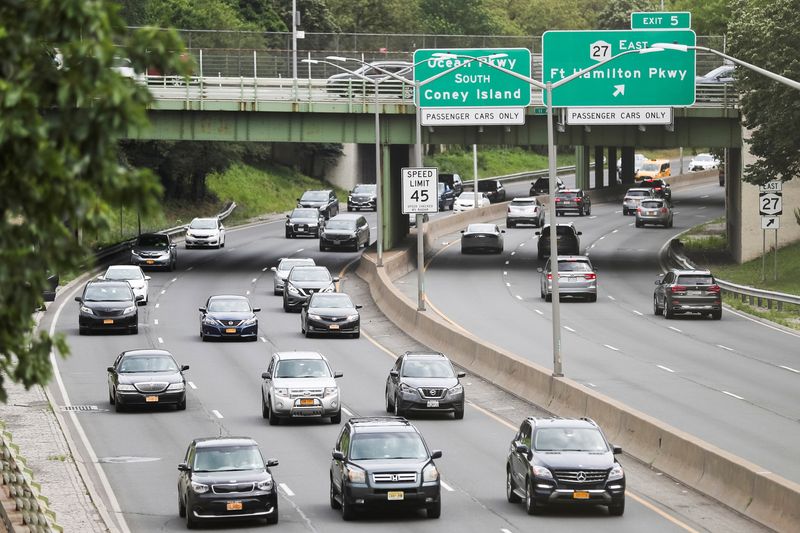By David Shepardson
WASHINGTON (Reuters) -The U.S. National Highway Traffic Safety Administration (NHTSA) on Sunday reinstated a sharp increase in penalties for automakers whose vehicles do not meet fuel efficiency requirements for model years 2019 and beyond.
The decision was a win for Tesla (NASDAQ:TSLA) that could cost other automakers hundreds of millions of dollars or more.
Confirming an earlier report by Reuters, NHTSA said https://www.nhtsa.gov/sites/nhtsa.gov/files/2022-03/2022-03-25%20CAFE%20Penalties%20FR%20-%20Website%20Version_0.pdf the decision "increases the accountability of manufacturers for violating the nation’s fuel economy standards" and the penalty increase "incentivizes manufacturers to make fuel economy improvements."
President Donald Trump's administration in its final days in January 2021 delayed a 2016 regulation that more than doubled penalties for automakers failing to meet Corporate Average Fuel Economy (CAFE) requirements starting in the 2019 model year.
NHTSA's final rule, which takes effect 60 days after it is published, reinstated the higher penalties and boosted them further for the 2022 model year. The agency has not collected penalties for 2019 to 2021 model years while the issue was under review and is the subject of court challenges.
The final rule was signed on Thursday by NHTSA's top official, Steven Cliff, ahead of its formal publication.
For the 2019 to 2021 model years, the fine is $14, up from $5.50, for every 0.1 mile per gallon new vehicles fall short of required fuel-economy standards, multiplied by the number of noncomplying vehicles sold. For the 2022 model year, this rises to $15.
Automakers protested the penalty hike in 2016, warning it could raise industry costs by at least $1 billion annually. The decision is expected to cost Chrysler parent Stellantis, for instance, as much as $572 million by the company's prior estimates, while boosting the value of compliance credits sold by Tesla.
Automakers whose vehicles achieve higher fuel economy than required can sell credits to automakers that do not meet CAFE rules.
Under President Barack Obama, the higher penalties were set to start with the 2019 model year, but the Trump administration set the effective date as the 2022 model year following a court decision.
NHTSA estimated that for the 2019 model year, automakers would owe $294 million at the new rate, up from $115.4 million under the prior rate.
NHTSA added automakers that made plans for 2019 through 2021 "thinking that penalties would not increase did so at their own risk."
The head of a trade group representing nearly all major automakers except Tesla said Sunday it would be a "better outcome" if the penalties "were invested in electric vehicles, batteries and charging infrastructure instead of disappearing into the general fund of the Treasury."
In August, NHTSA proposed hiking CAFE requirements by 8% annually for 2024 through 2026, reversing a Trump-era regulation that rolled back higher requirements starting in the 2021 model year. NHTSA is expected to issue its final CAFE rules through 2026 this week.
On Sunday, Stellantis said it would "like to work with the administration and Congress to allow the agencies to use the proceeds from penalties to bolster investments in the technologies and infrastructure required to accelerate a robust U.S. market for EVs."

Tesla did not immediately respond to a request for comment.
Congress in 2015 ordered federal agencies to adjust civil penalties to account for inflation. U.S. fuel economy fines lost 75% of their original value, having risen only once since 1975 - from $5 to $5.50 in 1997.